Monday, May 19th.—Remained at Camp Kirby Smith until May 19th; ordered to Big Creek Gap; left camp at 9 A. M.; marched about six miles through rough country.
(Note: picture is of an unidentified Confederate soldier.)

Monday, May 19th.—Remained at Camp Kirby Smith until May 19th; ordered to Big Creek Gap; left camp at 9 A. M.; marched about six miles through rough country.
(Note: picture is of an unidentified Confederate soldier.)

Near Corinth, Miss., May 19 ,1862.
Our regiment now is acting as a kind of rear guard for Pope’s division. The enemy’s cavalry in bodies of from 1,000 down have been running around our left flank and threatening to interfere with our trains. Every day we send out six companies to patrol between here and the river and forward. Yesterday (Sunday) I was out. We went to Red Sulphur Springs, one of the most romantic, beautiful places I have ever seen. There are about 40 double cottages for families, and stables, kennels and quarters for the servants, hounds and horses. The buildings are in good repair, though the place has not been frequented much for the last three or four years. White Sulphur Springs are four miles from the Red and more fashionable. I am going there to-morrow. There were about a dozen real ladies at the springs yesterday, and they were quite sociable and so interesting that I could not help staying an hour after the column left. We were the first of our soldiers that the party had seen and they were much surprised that our boys behaved so well. None of them had ever been North, and they occupied about all the time I was with them in asking questions, principally though, about the conduct of our army. About a mile before we got to the springs we passed a house where there were as many as six young ladies in full dress. The major sent me to make some inquiries of the man of the house, and I noticed the party were in something of a flurry but ascribed it to the presence of our men. Of course Sunday was [continue reading…]

From Abby
New York, May 19, 1862.
My Dear Children: I am writing in a bookstore down town. . . . We had a famous letter on Saturday from you, Georgy, and another, half Eliza’s half Charley’s. I did not discover at first at what word one broke off and the other began. Your adventures are like those of the fox and the goose and the bag of corn. I hope you will all come together after awhile, perhaps have done so already, as both these letters were directed in Charley’s handwriting. Charley himself ordered your Tribune transferred to our house, and it is coming regularly. I have all the numbers from May 1, and I understood Mother that she had in one of the trunks all the numbers up to that date. . . . Baskets of flowers, vegetables, mushrooms, butter, etc., came down on Saturday from Fishkill. . . .
I have bought all the shirts I could find at the employment societies. … Do you need grey or red flannel shirts. You may as well say out and out what your observation decides is needed, and don’t be mealy-mouthed as to asking, or in mentioning quantities. We can as well send hundreds as dozens, except that it takes a little more time to collect them. Money is no barrier, of course. If all we can do is to send things for you to make useful, do let us send enough! and do you use up fast enough. . . . Thomas Denny & Co., Mr. Aspinwall, Robert, and others have just made their money over to Jane, ” for you and your sisters to spend in any way for the soldiers,” and they all refuse to say what we shall buy or precisely how much shall be used here or sent there.
You remember I said Carry had gone down in search of Captain Parker, of the 16th. She picked out the handsomest man in the barracks, with pale complexion and long blonde beard, but he was in bed, undressed and fast asleep. The lists had not been made out, and no one knew if that were he. She had no flowers—nothing but a soft old cambric handkerchief which she cologned and laid on his pillow, but she had to come away without finding out who he was. . . . You must send any wounded officer to our house, using your discretion of course about it—those officers who have been used to refinement, and who need care. We should be very glad to entertain them and take care of them as they pass through the city, above all any officer of Joe’s regiment. Captain Curtis must certainly come to us when he is well enough to move. . . .
Jane has gone to the City Hospital this morning with her usual illustrated papers and pots of jelly. The mortality in the North house, where the fever patients are, is very saddening. They hardly seem sick at all, but they die. She takes down things one day to a man, and next day he is dead. Five or six is the daily number. . . . Good-bye, dear girls and boy.
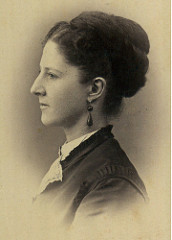
E. writes.
Spaulding (hospital ship)
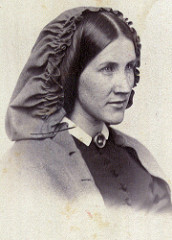
Georgeanna Wolsey to her Mother.
May 19.
We are lying in the Spaulding just below the burnt railroad bridge on the Pamunkey. It is startling to find so far from the sea a river whose name we hardly knew two weeks ago, where our anchor drops in three fathoms of water, and our ship turns freely either way with the tide. Our smoke stacks are almost swept by the hanging branches as we move, and great schooners are drawn up under the banks, tied to the trees. The Spaulding herself lies in the shade of an elm tree, which is a landmark for miles up and down. The army is encamped close at hand, resting this Sunday, and eating its six pies to a man, so getting ready for a move, which is planning in McClellan’s tent.
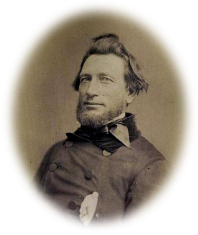
19th.–Marched to-day about eight miles, but by a road so indirect, that we are only five miles nearer to Richmond. I am to-night again detailed from my regiment, with orders to report for duty at the general hospital at White House.

Sunday!! Came again unawares upon me at Princeton. At 1 or 2 A. M. aroused to prepare to move. Moved off quietly; got off, again unmolested, to this point, viz., Bluestone River,
Mercer County, Virginia. I hope this is the last of the retreat. We have [the] Thirty-fourth, Twenty-eight, Twelfth, Twenty-third, Thirtieth, Thirty-seventh O. V. I.; Second Virginia Cavalry; and Simmonds’ and McMullen’s Batteries. The enemy reported to have three thousand or so under General Heth and five thousand or so under General Humphrey Marshall. The numbers are nothing, but at present our communications can’t well be kept up. All will soon be remedied under Fremont. Then, forward again! In the fights we have lost in our army, chiefly Thirty-seventh and Thirty-fourth, near one hundred killed, wounded, and prisoners.

18th.—The 16th was the day appointed by the President for fasting and prayer. The churches here were filled, as I trust they were all over the land.

MAY 18th.—All quiet to-day except the huzzas as fresh troops arrive.

Sunday, 18th–Our brigade threw up four miles of fortifications, earthworks, and also forts for the artillery. We were expecting to be attacked by the rebels making an effort to turn our right flank, so we were in line of battle all day. The pickets have been fighting all day, for the only action taken by the rebels was trying to drive in our pickets.

May 18th. Found us under way early, expecting to reach Natchez in the course of the day. About noon the order was given to get the anchor ready for letting go, and we looked ahead for an anchorage. In one of the everlasting bends of the river, on a bluff forty or fifty feet high, could be seen a few houses, and others on the river banks below, with a road running from one group to the other upon almost perpendicular banks. This was Natchez, and here we anchored alongside the sloops-of-war Brooklyn and Richmond, which had been here several days waiting for us. Natchez is not discernible from the river, as it lies mainly over the hill, back from the river; but, from present appearances, we should judge it to be a rather lazy city.

18th. Sunday. Wrote to Fannie. Attended preaching by Mr. Hawkins, from Isaiah 1st, 3rd verse, “My people doth not consider.”
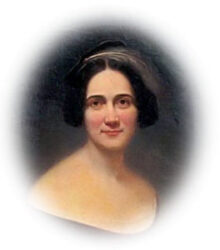
May 18th.–Norfolk has been burned and the Merrimac sunk without striking a blow since her coup d’état in Hampton Roads. Read Milton. See the speech of Adam to Eve in a new light. Women will not stay at home; will go out to see and be seen, even if it be by the devil himself.
Very encouraging letters from Hon. Mr. Memminger and from L. Q. Washington. They tell the same story in very different words. It amounts to this: “Not one foot of Virginia soil is to be given up without a bitter fight for it. We have one hundred and five thousand men in all, McClellan one hundred and ninety thousand. We can stand that disparity.”
What things I have been said to have said! Mr. _____ heard me make scoffing remarks about the Governor and the Council–or he thinks he heard me. James Chesnut wrote him a note that my name was to be kept out of it–indeed, that he was never to mention my name again under any possible circumstances. It was all preposterous nonsense, but it annoyed my husband amazingly. He said it was a scheme to use my chatter to his injury. He was very kind about it. He knows my real style so well that he can always tell my real impudence from what is fabricated for me.
There is said to be an order from Butler ¹ turning over the women of New Orleans to his soldiers. Thus is the measure of his iniquities filled. We thought that generals always restrained, by shot or sword if need be, the brutality of soldiers. This hideous, cross-eyed beast orders his men to treat the ladies of New Orleans as women of the town–to punish them, he says, for their insolence.
Footprints on the boundaries of another world once more. Willie Taylor, before he left home for the army, fancied one day–day, remember–that he saw Albert Rhett standing by his side. He recoiled from the ghostly presence. “You need not do that, Willie. You will soon be as I am.” Willie rushed into the next room to tell them what had happened, and fainted. It had a very depressing effect upon him. And now the other day he died in Virginia.
______
¹ General Benjamin F. Butler took command of New Orleans on May 2, 1862. The author’s reference is to his famous “Order No. 28,” which reads: ” As the officers and soldiers of the United States have been subject to repeated insults from the women (calling themselves ladies) of New Orleans, in return for the most scrupulous non-interference and courtesy on our part, it is ordered that hereafter when any female shall by word, gesture, or movement, insult or show contempt for any officer or soldier of the United States she shall be regarded and held liable to be treated as a woman of the town plying her vocation.” This and other acts of Butler in New Orleans led Jefferson Davis to issue a proclamation, declaring Butler to be a felon and an outlaw, and if captured that he should be instantly hanged. In December Butler was superseded at New Orleans by General Banks.

E’s Journal.
May 17, Spaulding.
Steaming up York River.
We have just been transferred to this big The boat, while the Wilson Small goes for repairs. This boat will accommodate four or five hundred men in bunks, now being put up by the carpenter and filled with mattresses stuffed by the “Lost Children” who are garrisoning Yorktown. . . .
May 18. My entry was broken short by the arrival of 160 men for the Knickerbocker, and we were once more very busy. They were all fed, – numbered, and recorded by name, (Charley’s work), and put to bed. Next morning arrived 115 more, for whom the Elizabeth with Miss Wormeley, Miss Gilson, and two men of the staff had been sent up Queen’s Creek – tired, miserable fellows, who had been lying in the wet and jolted over horrible roads. There was another tugboat full, too, and Mrs. Griffin and I took charge of both till the men were moved into the Knickerbocker.
We are now steaming up towards White House, all on deck enjoying the sail except Mr. Knapp and Charley, who are unpacking quilts for the bunks now ready.

18th.–Last night, after we had retired, the aids-de-camp of the several brigades, rode through the camp, and calling up the company commanders, read aloud: “Orders from Headquarters. Roll will beat at 5 in the morning. Army will move at half-past six, precisely.” All was bustle. The chests and boxes which had yesterday been packed for a move, in the morning, Unpacked in the afternoon, were again packed at night, which showed how eager our soldiers are to get to work. The roll, at 5 this morning, instead of calling them from their beds, summoned them to breakfast. They were ready, but had not finished their hurriedly prepared meal, when it was announced through the camp, “Order of last night, to move this morning, is countermanded.” If the oaths then perpetrated were recorded in heaven, the recording angel would certainly have been justified had he have “dropped a tear upon the page and blotted them out forever.” Our army swore terribly, but their ruffled feelings are now being calmed by the beautiful notes of Old Hundred, exquisitely performed by our band, and recalling, oh! how many sweet recollections of homes where many of us have, for the last time, had the warring elements of our souls soothed into quiet submission by the “peace, be still,” of this master piece of sacred music.
We are now in an intensely malarious region, with the sun’s scorching rays pouring on us, and our men coming down by scores daily. We have been nearly twelve months in the field, have fought but one battle, and I fear that General McClellan’s plan, to win by delay, without a fight, is poor economy of human life, to say nothing of the minor subject of wear and tear of patience; of the immense debt accumulating for somebody to pay, or of the major one of the effects of a protracted war on the morals of a nation.

Saturday, May 17. – A very hard day, – muddy, wet, and sultry. Ordered at 3 A. M. to abandon camp and hasten with whole force to General Cox at Princeton. He has had a fight with a greatly superior force under General Marshall. We lost tents, – we slit and tore them, – mess furniture, blankets, etc., etc., by this hasty movement. I was ordered with the Twenty-third, Gilmore’s Cavalry, and two pieces McMullen’s Battery, to cover the retreat to Princeton. We did it successfully, but oh, what a hard day on the men! I had been up during the night, had the men out, etc., etc. We were all day making it. Found all in confusion; severe fighting against odds and a further retreat deemed necessary. Bivouacked on the ground at Princeton.
Mem.: – I saved all my personal baggage, tent included; but no chance to use it at Princeton.

MAY 17th.—Gen. Lee has admonished Major Griswold on the too free granting of passports. Will it do any good?

Saturday, 17th–We were ordered to strike tent and march out to the picket line and form in line of battle. Here we remained in line until after dark. There was heavy cannonading and musketry firing all along the line and it continued all day. We pitched our tents in a heavy piece of timber and established camp number 8, in our siege of Corinth.
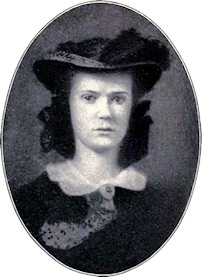
May 17th.
One of these days, when peace is restored and we are quietly settled in our allotted corners of this wide world without any particularly exciting event to alarm us; and with the knowledge of what is now the future, and will then be the dead past; seeing that all has been for the best for us in the end; that all has come right in spite of us, we will wonder how we could ever have been foolish enough to await each hour in such breathless anxiety. We will ask ourselves if it was really true that nightly, as we lay down to sleep, we did not dare plan for the morning, feeling that we might be homeless and beggars before the dawn. How unreal it will then seem! We will say it was our wild imagination, perhaps. But how bitterly, horribly true it is now!
Four days ago the Yankees left us, to attack Vicksburg, leaving their flag flying in the Garrison without a man to guard it, and with the understanding that the town would be held responsible for it. It was intended for a trap; and it succeeded. For night before last, it was pulled down and torn to pieces.
Now, unless Will will have the kindness to sink a dozen of their ships up there, – I hear he has command of the lower batteries, – they will be back in a few days, and will execute their threat of shelling the town. If they do, what will become of us? All we expect in the way of earthly property is as yet mere paper, which will be so much trash if the South is ruined, as it consists of debts due father by many planters for professional services rendered, who, of course, will be ruined, too, so all money is gone. That is nothing, we will not be ashamed to earn our bread, so let it go. [continue reading…]

17th. Saturday. Went up town and saw George Ashman. Went to the hotel and got breakfast. Cooked our own meals. Letter from Fannie Andrews.

17th.–But little worthy of note to-day, except the increasing impatience of the army. They begin to complain of the Commander in Chief, and, I fear, with some ground of justice. This morning the whole plain of 80,000 men, with its five hundred wagons, ambulances and carts, its five thousand horses, and all the paraphenalia of the army, was ordered to be ready to move at 12 M., precisely. At 11 we ate our dinners; then came the details of men for loading the heavy boxes and chests, striking, rolling and loading tents, which, by hard work, was accomplished by the hour fixed, and noon found us all in column; the word “march” was given, and off we started; moved about fifteen rods, wheeled (teams and all) out of the road into a beautiful field of wheat; wheeled again, and in a few minutes found ourselves right where we started from, with orders to unload and pitch tents. A few regimental groans went up as complimentary of the movement, and in two hours we were again settled. The object of this movement is now known to me, and so small and contemptible was it, so mixed up with the gratification of a petty vindictiveness, that, for the honor of the army, and some of its sub-commanders, I leave it unrecorded, hoping to forget it.

MAY 16th.—McClellan is intrenching—that is, at least, significant of a respite, and of apprehension of attack.

Friday, 16th–Nothing of importance has taken place today, but I think we will have a fight soon. We have plenty of rations, but the drinking water is very poor. The health of the men is better, however, since we have become more active, and the men are getting back their old-time vigor. Some of the boys who have been sick are now returning to the regiment. Major Abercrombie is in command of the regiment while Colonel Hare and Lieutenant-Colonel Hall are at home recovering from wounds received at Shiloh.

May 16th. After discharging through the night a line was attached to a kedge off our quarter, and a gunboat hauling at the same time, started her from the sand, and at ten o’clock the Hartford was again a thing of life. The day was spent in reloading.

16th. Rain obliged us to arise at five. Stayed under the wagon a while. Then went to the creek to wash. Reveille blew just before I got back. Lt. Hubbard arrested Brooks and me because somebody had wanted us and could not find us. Released us as soon as we came into camp. Rode partly on the wagons and walked some. Seemed good to get back to Fort Scott again. Found two letters from home.